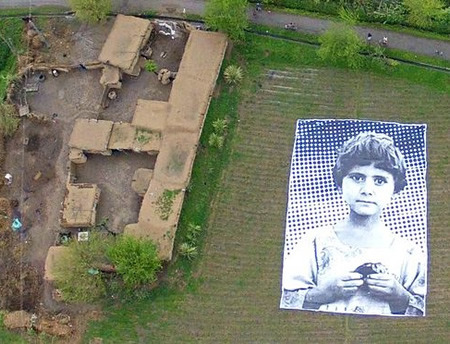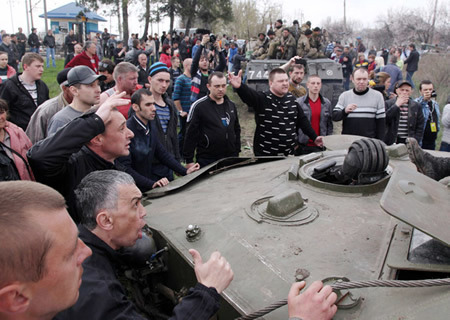David Swanson's Blog, page 114
May 1, 2014
The Art of Satyagraha
Michael Nagler has just published The Nonviolence Handbook: A Guide for Practical Action, a quick book to read and a long one to digest, a book that's rich in a way that people of a very different inclination bizarrely imagine Sun Tzu's to be. That is, rather than a collection of misguided platitudes, this book proposes what still remains a radically different way of thinking, a habit of living that is not in our air. In fact, Nagler's first piece of advice is to avoid the airwaves, turn off the television, opt out of the relentless normalization of violence.
We don't need the art of war applied to a peace movement. We need the art of satyagraha applied to the movement for a peaceful, just, free, and sustainable world. This means we have to stop trying to defeat the Military Industrial Complex (how's that been working out?) and start working to replace it and to convert the people who make up its parts to new behaviors that are better for them as well as for us.
It can seem out of place to shift from a discussion of the world's largest military to personal interactions. Surely giving John Kerry a complete personality transplant would leave in place corrupt elections, war profiteering, complicit media outlets, and the assumption held by legions of career bureaucrats that war is the way to peace.
No doubt, but only by learning to think and live nonviolence can we build an activist movement with the greatest potential to transform our structures of government. Nagler's examples highlight the importance of knowing what is negotiable, what should be compromised, and what must not be; what is substantive and what symbolic; when a movement is ready to escalate its nonviolence and when it is too soon or too late; and when (always?) not to tack on new demands in the middle of a campaign.
Tiananmen Square should have been abandoned and other tactics pursued, Nagler believes. Holding the square was symbolic. When protesters took over the Ecuadorean Congress in 2000 one of their leaders was elected president. Why? Nagler points out that the Congress was a place of power, not just a symbol; the activists were strong enough to take power, not just ask for it; and the occupation was part of a larger campaign that preceded and followed it.
Nagler has a lot of praise and hope for the Occupy movement, but also draws examples of failure from there. When a group of churches in one city offered to join with Occupy if everyone would stop cursing, Occupiers refused. Dumb decision. Not only is the point not to get to do every little thing we want, but we are not engaging in a struggle for power -- rather, in a learning process and a process of building relationships, even with those we are organizing to challenge -- and certainly with those who want to help us if we'll refrain from cussing. It can even be helpful, Nagler documents, to be accomodating to those we are challenging, when such steps are taken in friendship rather than subservience.
We are after the welfare of all parties, Nagler writes. Even those we want removed from office? Even those we want prosecuted for crimes? Is there restorative justice that can make an official who has launched a war see his or her removal from office and sanctioning as advantageous? Maybe. Maybe not. But seeking to remove people from office in order to uphold the rule of law and end injustices is very different from acting out of vengeance.
We should not seek out victories over others, Nager advises. But doesn't the organizing of activists require informing the deeply victory-dependent of every partial success achieved? Maybe. But a victory need not be over someone; it can be with someone. Oil barons have grandchildren who will enjoy a livable planet as much as the rest of us.
Nagler outlines obstructive and constructive actions, citing Gandhi's efforts in India and the first Intifada as examples of combining the two. The Landless Worker Movement in Brazil uses constructive nonviolence, while the Arab Spring used obstructive. Ideally, Nagler thinks, a movement should begin with constructive projects and then add obstruction. The Occupy Movement has gone in the opposite direction, developing aid for storm victims and banking victims after protests were driven out of public squares. The potential for change, Nagler believes, lies in the possibility of Occupy or another movement combining the two approaches.
Nagler's sequential steps in a nonviolent action campaign include: 1. Conflict Resolution, 2. Satyagraha, 3. The Ultimate Sacrifice.
I imagine Nagler would agree with me that what we need as much as peaceful behavior by our government is Conflict Avoidance. So much is done to generate conflicts that need not be. U.S. troops in 175 countries, and drones in some of the remaining few, are known to generate hostility; yet that hostility is used to justify the stationing of more troops. While it's important to realize we'll never rid the world of conflict, I'm sure we could come a lot closer if we tried.
But Nagler is outlining a plan for a popular campaign, not for the State Department. His three stages are a guide for how we ought to be outlining our future course of action. Step 0.5, then, is not Conflict Avoidance but Infiltration of Corporate Media or Development of Alternative Means to Communicate. Or so it occurs to me. I'll host Nagler on Talk Nation Radio soon, so send questions I should ask him to david at davidswanson dot org.
Nagler sees growing success and even greater potential for nonviolent action done wisely and strategically, and points out the extent to which violence remains the default approach of our government. And the case Nagler makes is made strong and credible by his extensive knowledge of nonviolent campaigns engaged in around the world over the past several decades. Nagler looks helpfully at successes, failures, and partial successes to draw out the lessons we need moving forward. I'm tempted to write a review of this book nearly as long as or even longer than the book itself, but believe it might be most helpful simply to say this:
Trust me. Buy this book. Carry it with you.
Olympic Capitalism: Bread and Circuses Without the Bread
The author of Brazil's Dance With the Devil, Dave Zirin, must love sports, as I do, as billions of us do, or he wouldn't keep writing about where sports have gone wrong. But, wow, have they gone wrong!
Brazil is set to host the World Cup this year and the Olympics in 2016. In preparation Brazil is evicting 200,000 people from their homes, eliminating poor neighborhoods, defunding public services, investing in a militarized police and surveillance state, using slave and prison labor to build outrageous stadiums unlikely to be filled more than once, and "improving" a famous old stadium (the world's largest for 50 years) by removing over half the capacity in favor of luxury seats. Meanwhile, popular protests and graffiti carry the message: "We want 'FIFA standard' hospitals and schools!" not to mention this one:

(FIFA = Fédération Internationale de Football Association, aka Soccer Profiteers International)
Brazil is just the latest in a string of nations that have chosen the glory of hosting mega sports events like the Olympics and World Cup despite the drawbacks. And Zirin makes a case that nations' governments don't see the drawbacks as drawbacks at all, that in fact they are the actual motivation. "Countries don't want these mega-events in spite of the threats to public welfare, addled construction projects, and repression they bring, but because of them." Just as a storm or a war can be used as an excuse to strip away rights and concentrate wealth, so can the storm of sporting events that, coincidentally or not, have their origins in the preparation of nations for warmaking.
Zirin notes that the modern Olympics were launched by a group of European aristocrats and generals who favored nationalism and war -- led by Pierre de Coubertin who believed sport was "an indirect preparation for war." "In sports," he said, "all the same qualities flourish which serve for warfare: indifference toward one's well being, courage, readiness for the unforeseen." The trappings of the Olympic celebration as we know it, however -- the opening ceremonies, marching athletes, Olympic torch run, etc., -- were created by the Nazis' propaganda office for the 1936 games. The World Cup, on the other hand, began in 1934 in Mussolini's Italy with a tournament rigged to guarantee an Italian win.
More worrisome than what sports prepare athletes for is what they may prepare fans for. There are great similarities between rooting for a sports team, especially a national sports team, and rooting for a national military. "As soon as the question of prestige arises," wrote George Orwell, whom Zirin quotes, "as soon as you feel that you and some larger unit will be disgraced if you lose, the most savage combative instincts are aroused." And there is prestige not just in "your" team winning, but in "your" nation hosting the grand event. Zirin spoke with people in Brazil who were of mixed minds, opposing the injustices the Olympics bring but still glad the Olympics was coming to Brazil. Zirin also quotes Brazilian politicians who seem to share the goal of national prestige.
At some point the prestige and the profits and the corruption and the commercialism seem to take over the athletics. "[T]he Olympics aren't about sport any more than the Iraq war was about democracy," Zirin writes. "The Olympics are not about athletes. And they're definitely not about bringing together the 'community of nations.' They are a neoliberal Trojan horse aimed at bringing in business and rolling back the most basic civil liberties."
And yet ... And yet ... the damn thing still is about sports, no matter what else it's about, no matter what alternative venues for sports are possible or imaginable. The fact remains that there are great athletes engaged in great sporting activities in the Olympics and the World Cup. The attraction of the circus is still real, even when we know it's at the expense of bread, rather than accompanying bread. And dangerous as the circus may be for the patriotic and militarist minded -- just as a sip of beer might be dangerous to an alcoholic -- one has the darndest time trying to find anything wrong with one's own appreciation for sports; at least I do.
The Olympics are also decidedly less militaristic -- or at least overtly militaristic -- than U.S. sports like football, baseball, and basketball, with their endless glorification of the U.S. military. "Thank you to our service men and women watching in 175 countries and keeping us safe." The Olympics is also one of the few times that people in the U.S. see people from other countries on their televisions without wars being involved.
Zirin's portrait of Brazil leaves me with similarly mixed sentiments. His research is impressive. He describes a rich and complex history. Despite all the corruption and cruelty, I can't help being attracted to a nation that won its independence without a war, abolished slavery without a war, reduces poverty by giving poor people money, denounces U.S. drone murders at the U.N., joins with Turkey to propose an agreement between the United States and Iran, joins with Russia, India, and China to resist U.S. imperialism; and on the same day this year that the U.S. Federal Communications Commission proposed ending the open internet, Brazil created the world's first internet bill of rights. For a deeply flawed place, there's a lot to like.
It's also hard to resist a group of people that pushes back against the outrages being imposed on it. When a bunch of houses in a poor Brazilian neighborhood were slated for demolition, an artist took photos of the residents, blew them up, and pasted them on the walls of the houses, finally shaming the government into letting the houses stand. That approach to injustice, much like the Pakistani artists' recent placement of an enormous photo of a drone victim in a field for U.S. drone pilots to see, has huge potential.
Now, the question is how to display the Olympics' victims to enough Olympics fans around the world so that no new nation will be able to accept this monster on the terms it has been imposing.
April 29, 2014
Promo and Station ID
Here's a 30 second promo that any station is welcome to use, and a station ID for 91.5 as an example; I'd be more than happy to produce one for any other station.
Talk Nation Radio: Fahad Desmukh: Western PR Firms Cover for Bahrain's Abuses
The brutal monarchy in Bahrain hires Western public relations firms (not to mention a lawyer now in the news for marrying U.S. actor George Clooney) to clean up its public image. We speak with Fahad Desmukh, a founding member of Bahrain Watch and a freelance journalist based in Karachi, Pakistan. He grew up in Bahrain and was among the first generation of bloggers in the country, writing under the pseudonym of "Chanad Bahraini". Bahrain Watch is an independent research and advocacy organization that seeks to promote effective, transparent and accountable governance in Bahrain. See https://bahrainwatch.org
Total run time: 29:00
Host: David Swanson.
Producer: David Swanson.
Music by Duke Ellington.
Download from Archive or LetsTryDemocracy.
Pacifica stations can also download from AudioPort.
Syndicated by Pacifica Network.
Please encourage your local radio stations to carry this program every week!
Please embed the SoundCloud audio on your own website!
Past Talk Nation Radio shows are all available free and complete at
http://davidswanson.org/talknationradio
Tim Carpenter Will Be Badly Missed
Tim Carpenter seemed unstoppable. He was part of the WarIsACrime website from day 1, when its name was AfterDowningStreet. He was part of activism in this country from long before that. He was an organizer, a lobbyist, a rabble rouser, and a talker. The cell phone never left his ear, but that didn't prevent him talking to you in person, and getting in more words per minute -- and all of them right to the point -- than an auctioneer. His emails were shorter, often a few words, or a single word. Often that word was "Teamwork!" But they made up for brevity in the sheer number of them. If anyone could make the current U.S. system of government work by combining electioneering and lobbying with street demonstrations, it was going to be Tim -- and sometimes he did, sometimes he nudged things in the right direction. I came to the conclusion sometime back that the system needed far more radical repairs, and that the catalyst would have to come from outside of it. But if there were 2 or 3 or 4 more Tim Carpenters in this country, I'd be willing to reconsider. And if they were healthy, I'd be willing to bet the farm on them. Tim struggled with health issues that would have sidelined lesser souls, and did so without slowing down. It's hard to believe he really left us today, not just because of the presence he was, but because he seemed to have nine lives. Let's hope the movements he advanced for peace and justice prove as resilient, and that they can be carried on, in whatever form becomes most strategic, in his memory.
April 25, 2014
Rep. Hurt Confuses Iraq and Afghanistan
"I have unconditional support for our brave men and women serving America overseas, as well as for their families. As our military commanders have said, we must remain steadfast in a clear strategy to defeat the insurgency and prevent Iraq from again becoming a safe-haven for international terrorists. I think that the withdrawal of our troops should be based on the conditions on the ground, not political agendas."
When WAS Iraq a safe-haven for international terrorists?
What American men and women (as opposed to weapons) are now "serving" in Iraq?
Does the Congressman have Iraq and Afghanistan confused?
And should a government that can't keep all of its wars straight still be fighting them?
And should it hide its decision to engage in these murderous expeditions behind pretended concern for the young people sent to do the killing?

April 25, 2014
Dear Mr. Swanson:
Thank you for your recent communication concerning the United States' current involvement in Afghanistan and Iraq. I appreciate your taking the time to express your thoughts on this important matter. I am grateful for the privilege of representing you and serving as a voice for the citizens of Virginia's Fifth District.
I have unconditional support for our brave men and women serving America overseas, as well as for their families. As our military commanders have said, we must remain steadfast in a clear strategy to defeat the insurgency and prevent Iraq from again becoming a safe-haven for international terrorists. I think that the withdrawal of our troops should be based on the conditions on the ground, not political agendas. We must not embolden the terrorists who believe that free societies will cave under the pressure of their violent acts. My highest priority is to safeguard our homeland. Please be assured that I will continue to monitor the conditions on the ground and will keep your thoughts in mind as events in Afghanistan and Iraq continue to unfold.
I hope you will stay connected to our office with updates on the latest news, legislation, and other useful information, by signing up for our e-newsletter on our website, hurt.house.gov. Thank you again for your communication and please do not hesitate to contact our office with any future questions or comments.
Sincerely,

Robert Hurt
Member of Congress

April 24, 2014
David Swanson to Speak in Los Angeles, May 10, on Ending All War

Flyer: PDF.
Sign-up: go here.
David Swanson is working to end all war with WorldBeyondWar.org.
His books include: War No More: The Case for Abolition, War Is A Lie, When the World Outlawed War, and The Military Industrial Complex at 50.
He is the host of Talk Nation Radio. He helped plan the nonviolent occupation of Freedom Plaza in Washington DC in 2011. He has worked as a newspaper reporter, as press secretary for Dennis Kucinich’s 2004 presidential campaign, and communications coordinator for ACORN. He blogs at DavidSwanson.org and WarIsaCrime.org and works for RootsAction.org Swanson is Secretary of Peace in the Green Shadow Cabinet.
Swanson will sign books.
United University Church
817 W 34th Street
Los Angeles, CA, 90089
Exposition Light Rail: Jefferson / USC Station
Parking in the UUC lot and Lot M. Access to UUC parking is through Gate 5, McClintock/Jefferson entrance to USC. Get a parking permit at Gate 5 kiosk. Tell them you are going to the church. Turn left onto 34th Street and then next left onto Watt Way. Turn right into Lot M and go through Lot M to UUC Lot.
12:00 - 2:30 p.m. May 10, 2014
Free Admission, Open to All.
Wheelchair accessible.
Sponsored by: California Peace Alliance, Interfaith Communities United for Justice and Peace, Military Families Speak Out, MLK Coalition LA, Peace Center of United University Church, Project Great Futures, Topanga Peace Alliance, United Teachers of Los Angeles Human Rights Committee, and Veterans For Peace.
CONTACT: Kathleen at 310-339-1770.
If War Was Funded Like College Tuition
Are you as tired as I am of news stories about college tuition costs rising? I've been out of college for many years, and you'd have to pay me to go back, but this is ridiculous.
To see how ridiculous, try a little thought experiment. Imagine opening your newspaper and reading this:
"War and War Preparations Costs to U.S. Households Rose Again This Year
"Continuing a decades-long trend, the cost each U.S. resident pays for his or her wars and war preparations rose 5.3 percent this year.
"With all costs of the U.S. military, across numerous government departments, reaching $1.2 trillion annually, according to Chris Hellman of the National Priorities Project, and with a U.S. population of 314 million people, bills to those opting for war-making as their foreign policy choice this year came to $3,822 each -- not counting room, board, and books."
Of course, that bill is for anyone who supports the U.S. government's spending priorities and anyone who doesn't, and it's a bill for every person, from disabled senior citizen to new-born infant.
It's a bill that might strike some as a bit high. So, here's one way this imaginary news story might develop:
"In an expanding trend, thousands of Americans opted for a smaller military investment this year. Choosing to pay their share of a military the size of China's -- $188 billion, according to the Stockholm International Peace Research Institute -- some war consumers bought the $599 war plan this year.
"Others opted for the Russian model at a cost of $280. But with polls showing that Americans believe Iran to be the greatest threat to peace, the Iranian-sized military has become this year's most rapid climber in the rankings; of course, the $20 price tag doesn't hurt.
"Buddy Beaverton of Sioux Falls, South Dakota, remarked at the post office as he mailed a check: 'If we could have Canada's annual supply of wars for $59 each, why should I have to pay $3,822? It's bad enough they've got cheaper prescription drugs that we're not allowed to buy!'"
Mr. Beaverton would have a point. Some other nations that don't invest in wars and war preparations the way the United States does also make college education free or affordable -- and still have plenty of money to spare for frivolous luxuries like healthcare or energy systems that don't render the planet unlivable.
What would our lives be like if college were as free and unquestionable as military spending is now, but military spending arrived as an optional bill?
Those who didn't want it could choose not to pay. Those who wanted a coast guard, a national guard, and some anti-aircraft weapons could chip in a few bucks. Those who wanted a bit more than that could pay a bit more.
And those who wanted troops in 175 nations, aircraft carriers in every sea, enough nuclear weapons to destroy life on several planets, and fleets of drones with which to traumatize and antagonize several nations at once -- well, they could pay their $3,822, plus of course another $3,822 for anybody opting out.
What a naive proposal! Left to individual choice, the commons would be destroyed, and our national defense would crumble!
Really? People in the United States give over $300 billion to charity each year. Nobody forces them to. If they believed weapons and wars were the most important cause to donate their dollars to, they'd do it. No nation on earth spends $300 billion or anywhere close to it on its military, other than the United States.
And with the government no longer funding the military in its socialistic manner, it might choose instead to fund many of the humanitarian causes to which private charity is now largely devoted. Private giving could take care of the Pentagon.
But if wisdom about the counter-productive results of militarism spread, if nonviolent alternatives were learned, if free college had a positive impact on our collective intellect, and if the fact that we could end global poverty or halt global warming for a fraction of current military spending leaked out, who knows? Maybe militarism would fail in the free market.
April 23, 2014
Talk Nation Radio: Charles Komanoff: We Need a Carbon Tax
 https://soundcloud.com/davidcnswanson/talk-nation-radio-charles-komanoff-we-need-a-carbon-tax
https://soundcloud.com/davidcnswanson/talk-nation-radio-charles-komanoff-we-need-a-carbon-tax
Charles Komanoff is an activist, economist and policy-analyst. He directs the Carbon Tax Center and develops traffic-pricing modeling tools for the Nurture Nature Foundation. His work includes books (Power Plant Cost Escalation, Killed By Automobile, The Bicycle Blueprint), computer models, scholarly articles, and journalism. He discusses the need for a carbon tax. See http://carbontax.org
Total run time: 29:00
Host: David Swanson.
Producer: David Swanson.
Music by Duke Ellington.
Download from Archive or LetsTryDemocracy.
Pacifica stations can also download from AudioPort.
Syndicated by Pacifica Network.
Please encourage your local radio stations to carry this program every week!
Please embed the SoundCloud audio on your own website!
Past Talk Nation Radio shows are all available free and complete at
http://davidswanson.org/talknationradio
April 20, 2014
Three Images the World Needed
Employees of the U.S. government refer to people they murder as "bugsplat." They pretend that the men, women, and children they are killing with drones are just bugs, because they just look like little fuzzy creatures on a computer screen. Thank goodness for the artists who have put a giant portrait of a child in a field for the drone murderers to see and think about. Maybe the rest of us could think about it, and do more than think about it, too.

In Davidson, North Carolina, among many other places in the world, wealthy people ignore the suffering of the poor right nearby them as well as thousands of miles away. A fraction of what the U.S. government spends killing people with drones could end starvation in the world, and many certainly seem not to care. A fraction of what someone spends in a shopping mall could make a real difference in the life of someone sleeping on a bench, but most people provide no help.
But in an odd irony, many people in North Carolina, among many other places in the world, cling to ancient magical beliefs that just happen to include worshiping a man who was poor and who recommended caring for the poor. A sculpture of a homeless Jesus, a man you're supposed to worship because he has nail marks on his metallic feet, has got some people wondering whether they should find a little decency and compassion for those homeless people on benches who are made of flesh and blood.

CIA Director John Brennan, aka Obama's Cheney, was dispatched to Ukraine, where the U.S. had already spent $5 billion stirring up trouble. Ukrainian troops were immediately sent to attack protesters in eastern cities. Brennan may have had drones in his head. Drones have been known to crash, but never to stop and have a beer with the enemy. Drones often blow up the "wrong people," but they don't invite people to climb on board and share a laugh. When unarmed Ukrainians confronted tanks, many soldiers joined the people. How Brennan thought Ukrainians could be sent to kill Ukrainians seems a mystery after the images of human decency have taken over. How Christians think the poor and homeless, the hungry and ill-clothed can be blamed for their own inability to satiate their greed seems baffling when faced with the homeless Jesus. How drone "pilots" can sit and take part in the world's worst real-life Milgram experiment ought to horrify anyone who stops and thinks -- and nothing can make people stop and think the way a great work of art can. A picture is worth a million words, and a few lives let's hope.






